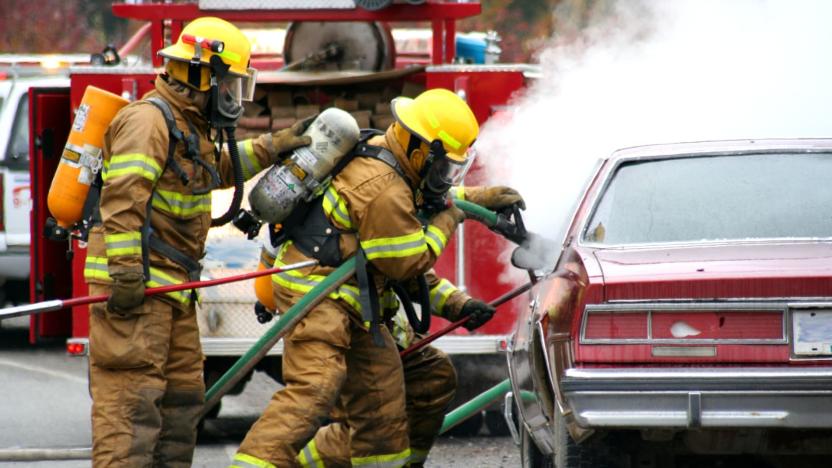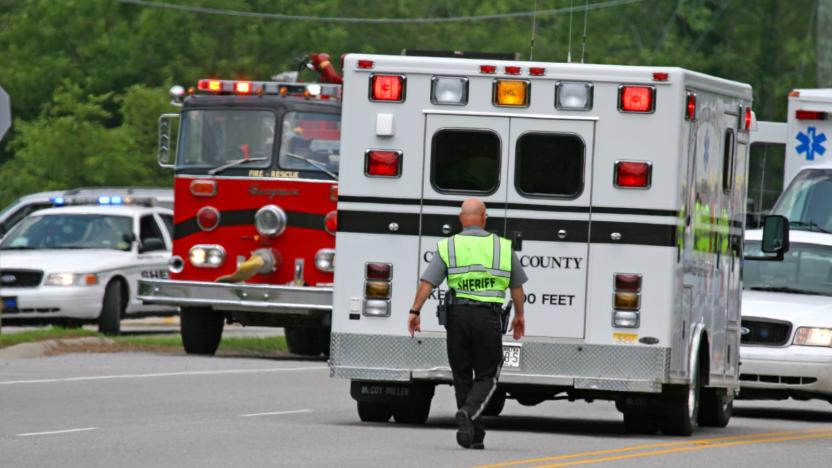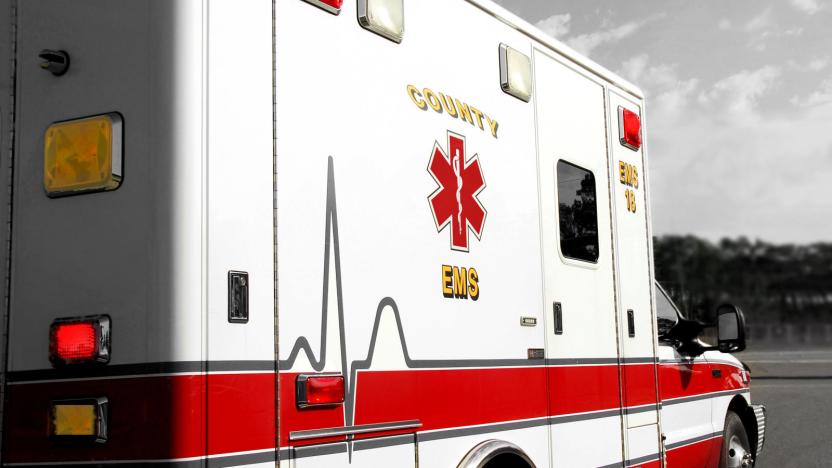publicsafety
Latest

AT&T opens its public safety network to volunteer first responders
AT&T's approach to a public safety network has been available for a while, but only for emergency crews that supply phones and plans. That's not much good if you're a volunteer firefighter or otherwise have to bring your own device. However, you won't be out of the loop for long. AT&T has launched FirstNet plans for first responders who have to use personal accounts, whether they're volunteers or careerists. You'll need to be verified and use a FirstNet-friendly device like the Galaxy S9 or V35 ThinQ, but you'll use the same dedicated emergency network as other crews.

AT&T launches the base of its FirstNet public safety network
After roughly a year of partnership, AT&T's LTE-based FirstNet public safety network is starting to come alive -- the carrier has launched the service's network core nationwide. The rollout provides the foundation for a communications network devoted solely to emergency crews, with multiple priority levels and toughened security that includes around-the-clock monitoring. This doesn't represent full-fledged service, but it's now more a matter of weeks than months.

All 50 states opt in to AT&T’s FirstNet public safety network
FirstNet, the nationwide broadband network for first responders, will be the official public safety network for all 50 US states. The network has been a very long time coming. Having been initially proposed following the 9/11 attacks, the FCC approved LTE to be the standard on which it would function back in 2011. In March, AT&T was selected by the First Responder Network Authority to build and run the network and in June, the company began sending its plans to state governments for review. States had until yesterday to decide whether they would opt in or out of the program and all 50 decided to approve it. Washington DC, Puerto Rico and the US Virgin Islands also opted in while American Samoa, Guam and the Northern Mariana Islands have until March 12th to make their decisions.

Seattle PD has a YouTube channel for its body camera footage
Seattle's officer-worn camera footage is making its way online, but if you were hoping for anything Cops-like you're likely to be disappointed. In accordance with privacy measures, faces aren't the only parts of a shot that are blurred out -- most of the time it's the entire frame, and audio's been scrubbed as well. Seattle's police department's using methods recommended by volunteer hacker Tim Clemans, and according to SPD Blotter, the redacting process only took half-a-day to process four hours of raw video. Comparatively, the force's old methods would take upwards of a 60 minutes to obfuscate a single minute of footage.

Samsung will broadcast public safety announcements over LTE this year
Samsung's got strong LTE (and LTE-A, and... whatever's next) bones and now it's looking to shift the commercial tech into the emergency services. Public safety announcements has been a project of the 3GPP for a while. What's that, you say? It's a ragtag gang of superheroes telecoms groups and organizations that hammers out the crucially important (but typically very dry) standards and technical specifications -- these have formed the basis for the likes of 3G and LTE in the past. Samsung's public safety LTE (PS-LTE) is apparently geared for first responders and use during "emergency situations". Importantly the option of a new kind of public safety announcement network will take the drag off existing networks, as well as offer the data heft of LTE network, hopefully ensuring communication remains possible in even the most dire situations.

US and Canada reach border spectrum sharing deals for broadband
Wireless use along the US-Canada border can be problematic: when there isn't direct interference, there's sometimes a fight over which devices get dibs on given frequencies. Don't worry that the countries will rekindle their old disputes, though -- instead, they've just struck interim deals to share more of their spectrum. Along with harmonizing 700MHz public safety networks, the pacts address AWS (1,700MHz and 2,100MHz), PCS (1,900MHz), 3.7GHz wireless broadband, mesh networks and even WiFi hotspots. When possible, both sides will use contention protocols to automatically resolve any conflicts. While the deals aren't yet final, they should be strong enough to maintain some semblance of peace on the northern airwaves. [Image credit: National Film Board of Canada. Photothèque / Library and Archives Canada]

US and Mexico strike public safety spectrum deal along national borders
The FCC announced today that Chairman Julius Genachowski has entered into an agreement with Mexico's telecommunications officials to create a new spectrum sharing scheme along the nation's borders. The move will normalize 800MHz and 1900MHz spectrum use within 68 miles of the common border, and is primarily intended to reduce interference and allow for reliable public safety communications in the region. Further rollout of commercial services is also central to the pact, as Sprint has been authorized to deploy its CDMA service in the 1900MHz spectrum along the border. The move is hardly a free gift, however, as Sprint had previously surrendered a share of its 800MHz holdings to pave way for the agreement. A bi-national task force will oversee the adjustment process, and both nations have agreed to discuss future spectrum coordination along the border in future meetings. Proof that cooperation isn't completely dead, folks. To gain a greater understanding of where both nations are headed, just hop the break for the announcement.

Tobii looks to keep you alert by detecting when you're tweet-driving (video)
Don't think you'll get caught checking the Duke score while cruisin' down the highway? Soon, you may have to think twice before hitting the scoreboard. Tobii has unveiled its new technology that detects drowsiness and distraction in on-board driver safety systems. The platform is based on the company's advanced eye tracking tech to bolster automobile safety on the highways and byways. The system detects eyes of all shapes, sizes, and colors -- without calibration -- even if the driver is wearing glasses or a pair of Ray Ban shades. A constant stream of data communicates to the watchman the driver's condition, regardless of changes in environment or if the person behind the wheel takes a quick peek out the window. Tobii isn't looking to stop here either, as it says eye control of in-cabin infotainment systems is within reach. Perhaps this time next year, we'll be able to browse that Spotify collection with a series of blinks -- one can only hope.

FCC hails spectrum alliances with Canada and Mexico, seeks to reduce border conflicts
It's not every day that the FCC enters into new multinational agreements, so you'll have to forgive us for getting excited over the latest communique between Chairman Julius Genachowski and his counterparts in Canada and Mexico. After much negotiation, the regulatory heads have created a framework to resolve frequency conflicts along our nations' borders. While the deal with Mexico only applies to the 700MHz spectrum, the agreement with Canada also covers the 800MHz range. By reducing interference and maximizing spectrum allocation, Genachowski believes "these arrangements will unleash investment and benefit consumers near the borders by enabling the rollout of 4G wireless broadband service and advanced systems for critical public safety and emergency response communications." Once the policies become official mandates, license holders must coordinate and implement techniques to mitigate signal interference or face some nasty regulatory intervention. If you're a sucker for policy, just leap the break for the full press release.

PLAN emergency alert system going mobile in NYC and DC this year, nationwide in 2012
If you live in the U.S., you've probably seen those anger-inducing emergency alert system test messages that interrupt your favorite programming on a weekly basis. Most of us have never seen the system used in an actual emergency, but come later this year, cell phone users in New York and Washington will have similar alerts pushed to their mobile devices -- presumably without the annoying weekly tests. Known as PLAN (Personal Localized Alerting Network), the free service will reportedly only work with smartphones (we're guessing the GPS comes into play here) on AT&T&T, Sprint and Verizon. The secure messaging network will likely display messages as notifications, rather than texts, and will push to all compatible devices within an affected area based on the phone's physical location, not just its mobile number. Local, state and federal officials will send notifications in response to disasters and other public safety threats, presidential announcements, and Amber Alerts. In other words: it'll only be used for actual emergencies, so don't expect updates on the whereabouts of your favorite captive reptile.

FCC going after cellphone jammers, could land users in the slammer
The FCC has put a bounty on the heads of all the cellphone-hating vigilantes out there. These GPS and signal jammers are particularly popular amongst theaters, quiet restaurants and in many school systems fighting the good fight against sexting during class. The FCC is calling on folks to stop and to report their neighbors for using these devices -- reason being that they pose serious health and safety risks by interfering with 911 calls and other emergencies in the vicinity. So if you know a so-called 'jammer,' don't hesitate to file a complaint about them to the FCC -- the info can be found at the source link below.

Verizon dropped 10,000 emergency calls during January snowstorm in Maryland, FCC finds it 'alarming'
Uh oh, Verizon's got itself into a bit of hot water with the old FCC. An outage during a snowstorm last month has reportedly resulted in a whopping 10,000 calls to 911 not being connected by the big red carrier. That would be bad enough in itself, but the less-than-pleased Communications Commission also notes that the emergency services that missed out on these calls were not alerted to the connectivity failure -- in fact, Maryland's Montgomery County officers were the ones to inform Verizon of the fault it was having, which was then promptly repaired within 15 minutes. The FCC is now curtly asking the network to check its entire footprint for similar vulnerabilities -- as the January events were apparently "not unique" -- and to propose remedial actions and monitoring systems to prevent it happening again.

FCC unanimously approves LTE standard for nationwide public safety network
The FCC's been looking to establish a nationwide public safety network since the early days of the infamous 700MHz spectrum auction, and while it never quite accomplished that task, the commission has made a small but important step -- it's unanimously decided that Long Term Evolution (LTE) will be the one ring that binds all future chunks of public safety radio band. Of course, this wasn't a terribly hard decision for the FCC to make, as major commercial cellular carriers and a number of regional public safety agencies have already invested in LTE equipment for the 700MHz band... and the decision doesn't yet specify a voice standard. All that's been decided upon is how those countless packets of data will float over the air. How will disparate groups of first responders communicate with one another in the event of a national emergency? That's what the organization is asking you right now -- feel free to contact the FCC anytime within the next 45 days with your proposal.

Public safety agencies want D Block for themselves, FCC still seeking auction
The 700MHz 'D Block' has been the subject of much debate over the past few years, primarily because the FCC's master plan to auction it off -- yet require the winner to open up the waves for public safety use on command -- didn't exactly pan out. Post-failure, the agency made clear its plans to host up another auction or two in order to accomplish the same goal via slightly different means, but now public safety entities are coming forward with a healthy amount of opposition. Rob Davis, head of the San Jose Police Department, puts it bluntly: "If they auction this spectrum, we've lost it forever." These public safety officials also have allies in Congress, with many worried that auctioning off the spectrum may lead to an inability to accurately wield bandwidth in a hurry if needed during a national emergency. The FCC plan also alleviates the cost issue, but public advocates have a solution there as well -- they say that if given the 'D Block' outright, they could "lease excess airwaves to commercial carriers since they would not always need all of it." Of course, that's a pretty big assumption about the willingness of carriers to lease space, and we suspect a lot more back-and-forth will go on here in the coming months. Oh, the drama.

Court sticks to its guns, Sprint has to vacate bandwidth by June
It's been known for years that some of Sprint Nextel's Direct Connect spectrum causes bouts of interference with public safety equipment, and the FCC got the ball rolling on a plan several years ago for the carrier to swap some airwaves with agencies around the country by June of this year to keep everyone happy. Problem is, some 500 of those agencies still aren't ready to trade, and Sprint has taken issue with the fact that the FCC wants it to meet its end of the bargain by next month anyhow. Nevertheless, a federal appeals court has ruled in the FCC's favor, setting the wheels in motion for a possible massive loss of Nextel coverage on the drop-dead date of June 26 -- but industry analysts aren't too worried. Most seem to be predicting that the FCC will end up extending the deadline by six months or so anyway, so Kevin Martin and his ragtag gang must just love watching carriers sweat. Oh, not to mention a few million Direct Connect customers.[Via Phone Scoop]

Up next on the FCC spectrum auction block: 700MHz band
We know, jostling over the almighty 700MHz band may not be as exciting as tossing in your bid for the one and only PowerFest '94 cartridge, but for wireless providers and startups alike, this one is big. The FCC has finally announced technical specifications for the upcoming 700MHz band auction, which is being dubbed the "most valuable available slice of radio-frequency spectrum," but are holding out on the anxious bidders by "not deciding exactly how the spectrum will be divided and sold off." The Congressional Budget Office has reckoned that "as much as $15 billion" could be added to the federal treasury as a result of the auction, as the swath of airwaves in the 700MHz range is being "vacated by television broadcasters as they make the transition to digital TV," which makes for "prime territory for providing advanced wireless broadband services." The FCC Chairman was quoted as saying that this auction would hopefully enable a "third pipe to the home" to be constructed in order to provide "affordable broadband to all Americans." If all this sounds interesting, and you've got billions laying around collecting dust, it sounds like you're in for quite the battle come auction time.








